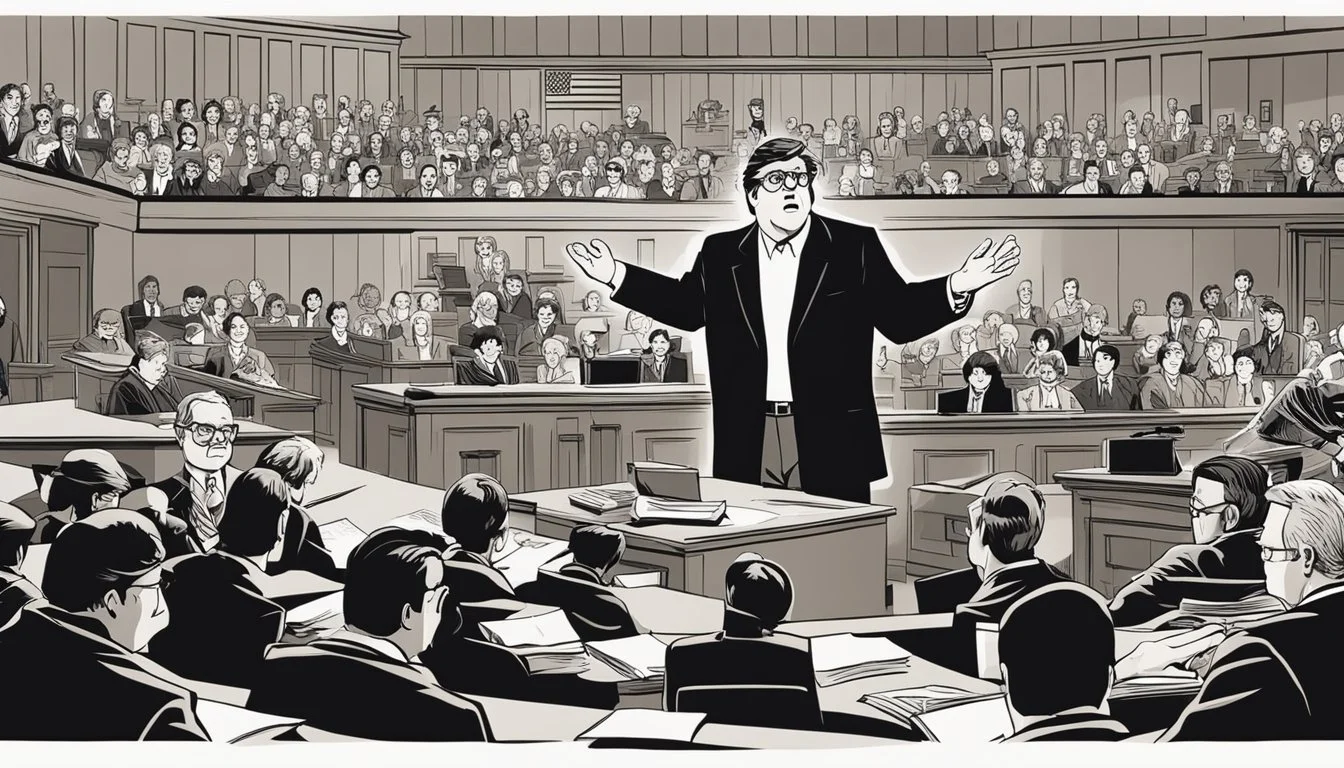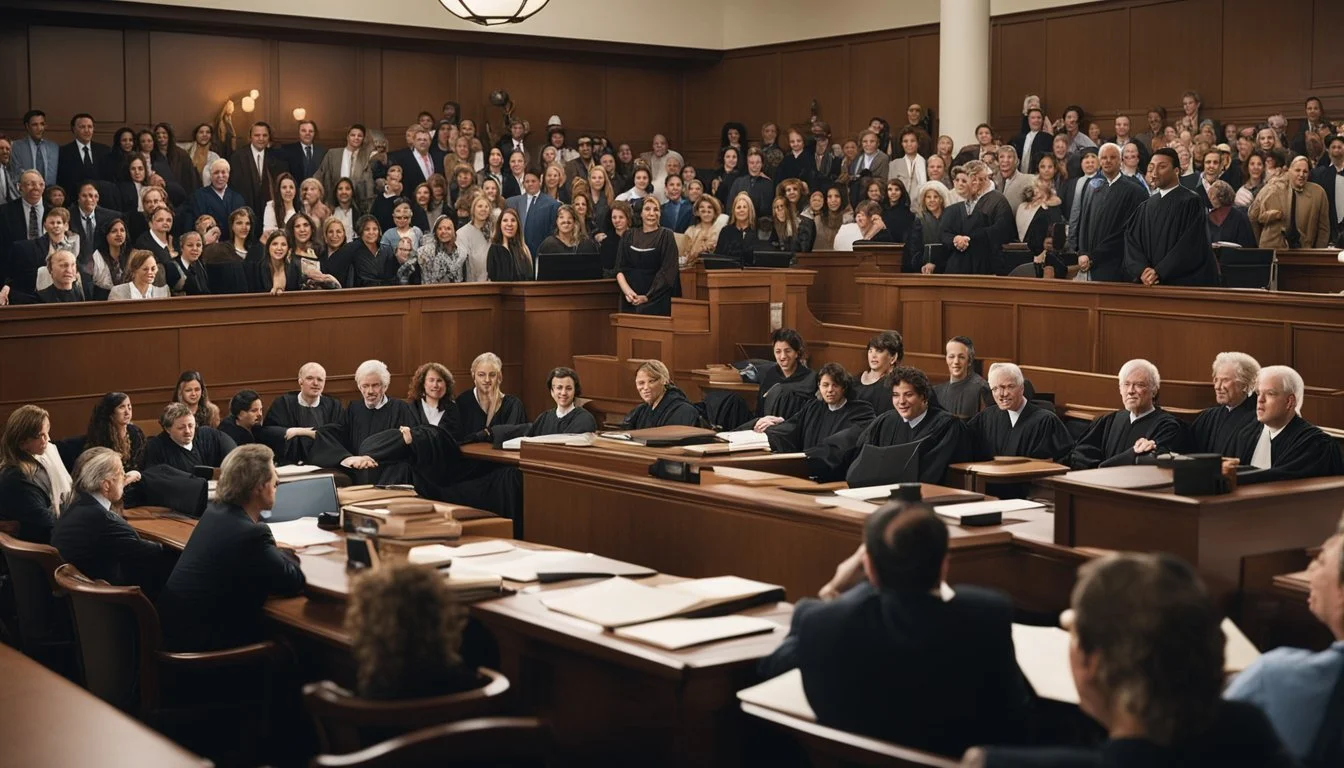Michael Moore Faces Legal Battles Over Controversial Healthcare Documentary
Michael Moore's 2007 documentary "Sicko" sparked intense debate about the American healthcare system. The film critiqued the U.S. health insurance industry and compared it unfavorably to universal healthcare systems in other countries. While "Sicko" garnered praise for raising awareness about healthcare issues, it also faced accusations of bias and factual inaccuracies.
The documentary's release led to legal challenges and investigations. Critics argued that Moore's portrayal of healthcare systems in countries like Cuba was overly optimistic and misleading. Some insurance companies and healthcare providers disputed the film's claims, leading to threats of lawsuits and demands for corrections.
Despite the controversy, "Sicko" had a significant impact on public discourse about healthcare reform. The film's emotional stories and stark comparisons resonated with many viewers, contributing to ongoing debates about the future of healthcare in the United States. The legal and ethical questions raised by "Sicko" highlight the complex intersection of documentary filmmaking, advocacy, and journalistic responsibility.
Background of 'Sicko'
Michael Moore's 2007 documentary 'Sicko' examined the American healthcare system through a critical lens. The film sparked debates and legal challenges, building on Moore's reputation for provocative filmmaking.
Michael Moore's Profile
Michael Moore is an American filmmaker known for his confrontational style and left-leaning political documentaries. Born in 1954 in Flint, Michigan, Moore gained prominence with his 1989 film 'Roger & Me'. He has a reputation for tackling controversial subjects and using humor to address serious issues.
Moore's work often focuses on social and political topics, including gun violence, corporate power, and healthcare. His films have won numerous awards, including an Academy Award for Best Documentary Feature.
Overview of 'Sicko' Documentary
'Sicko' explores the shortcomings of the U.S. healthcare system, comparing it to universal healthcare models in other countries. The film features interviews with Americans struggling with medical costs and insurance denials.
Moore visits Canada, the United Kingdom, France, and Cuba to showcase their healthcare systems. He highlights the affordability and accessibility of medical care in these nations compared to the United States.
'Sicko' criticizes the influence of pharmaceutical companies and insurance providers on American healthcare policy. The documentary sparked debates about healthcare reform and drew both praise and criticism for its approach to the subject.
Preceding Works: 'Bowling for Columbine' and 'Fahrenheit 9/11'
'Bowling for Columbine' (2002) examined gun violence in America. The documentary won an Academy Award and established Moore as a prominent voice in political filmmaking.
Key topics in 'Bowling for Columbine':
Gun culture in the United States
The Columbine High School massacre
Media portrayal of violence
'Fahrenheit 9/11' (2004) focused on the Bush administration's actions following the September 11 attacks. It became the highest-grossing documentary at the time of its release.
'Fahrenheit 9/11' covered:
The 2000 U.S. presidential election
Connections between the Bush family and Saudi Arabia
The Iraq War
These films solidified Moore's reputation for creating provocative, politically charged documentaries that challenge viewers and spark public discourse.
The Healthcare Debate in the United States
The U.S. healthcare system faces complex challenges involving access, affordability, and quality of care. Insurance companies play a central role, while millions remain uninsured or underinsured.
The State of U.S. Health Care System
The United States spends more on healthcare than any other developed nation, yet outcomes often lag behind. In 2019, healthcare expenditures reached $3.8 trillion, accounting for 17.7% of GDP. Despite high spending, the U.S. ranks poorly in key health metrics compared to other wealthy countries.
Life expectancy in the U.S. has declined in recent years. Chronic diseases like diabetes and heart disease remain prevalent. The system excels in specialized and emergency care but struggles with preventive medicine and managing long-term conditions.
Access to care varies widely based on location, income, and insurance status. Rural areas face shortages of medical facilities and professionals. Many Americans delay or forgo necessary treatment due to costs.
Insurance Companies' Role
Private insurance companies dominate the U.S. healthcare landscape. They negotiate rates with providers, process claims, and determine covered services. Critics argue this system prioritizes profits over patient care.
Insurance plans often have complex rules and high out-of-pocket costs. Deductibles, copays, and coinsurance can make even insured individuals hesitant to seek care. Networks limit which doctors patients can see without paying more.
Insurers have been accused of denying claims unfairly or dropping coverage for sick individuals. The Affordable Care Act introduced regulations to curb some of these practices, but challenges remain.
The Plight of the Uninsured and Underinsured
Millions of Americans lack health insurance entirely. Many work jobs that don't offer coverage or can't afford premiums. Some fall into coverage gaps, earning too much for Medicaid but too little for marketplace subsidies.
The uninsured often rely on emergency rooms for basic care, driving up costs. They may skip preventive services and delay treatment until conditions worsen. Medical debt is a leading cause of bankruptcy in the U.S.
Even those with insurance can be underinsured. High deductibles and limited coverage leave many vulnerable to significant out-of-pocket expenses. Surprise billing and in-network/out-of-network complications add to the financial strain.
Legal and Ethical Analysis
Michael Moore's 'Sicko' sparked debates on free speech, healthcare system criticisms, and the concept of healthcare as a right. The film's impact extended beyond entertainment, raising important legal and ethical questions.
Freedom of Speech vs. Propaganda
'Sicko' tested the boundaries between documentary filmmaking and political propaganda. Moore's critics argued that the film presented a biased view of the American healthcare system. Supporters countered that it was protected speech under the First Amendment.
The film's portrayal of other countries' healthcare systems faced scrutiny. Some accused Moore of cherry-picking information to paint an overly rosy picture of foreign systems. Legal experts debated whether such selective presentation crossed ethical lines.
Moore's trip to Cuba for the film drew particular attention. The U.S. Treasury Department investigated whether it violated travel restrictions. This raised questions about the limits of journalistic freedom in politically sensitive areas.
Healthcare System Criticisms and Defenses
'Sicko' leveled harsh criticisms at the profit-driven American healthcare system. It highlighted cases of denied coverage and financial ruin due to medical bills. These claims prompted legal and ethical debates about the responsibilities of insurance companies.
The film's depiction of healthcare providers sparked discussions on medical ethics. It questioned whether the profit motive conflicted with the Hippocratic oath. Some medical professionals defended the system, arguing that it promotes innovation and quality care.
Insurance companies faced increased scrutiny following the film's release. Some launched PR campaigns to counter Moore's narrative. Legal experts examined whether the film's claims could lead to class-action lawsuits against insurers.
The Right to Healthcare
'Sicko' reignited debates about healthcare as a fundamental right. It compared the U.S. system to countries with universal coverage, prompting discussions on constitutional interpretations. Legal scholars examined whether existing laws support or hinder the concept of healthcare as a right.
The film's impact extended to policy debates. It influenced discussions on healthcare reform, including the Affordable Care Act. Ethicists debated the moral obligations of a society to provide healthcare for all citizens.
Moore's argument for universal healthcare raised questions about individual rights versus collective responsibility. It sparked debates on the role of government in healthcare provision and the balance between personal liberty and social welfare.
International Healthcare Perspectives
Michael Moore's 'Sicko' sparked debates on healthcare systems worldwide. It highlighted key differences between the U.S. model and other nations' approaches to providing medical care.
Comparison with Canadian and British Systems
Canada and the UK operate universal healthcare systems. The Canadian model, known as Medicare, provides coverage to all citizens and permanent residents. It's funded through taxes and administered by provinces.
The British National Health Service (NHS) offers free care at the point of use for all legal residents. It's funded primarily through general taxation.
Both systems face challenges like wait times for non-emergency procedures. However, they generally receive high public approval ratings. Neither country experiences medical bankruptcies at the rates seen in the U.S.
The Cuban Healthcare Model
Cuba's healthcare system garnered attention in 'Sicko' for its comprehensive coverage despite limited resources. The country emphasizes preventive care and community-based health initiatives.
Cuba boasts a high doctor-to-patient ratio and has achieved health outcomes comparable to more developed nations. Life expectancy and infant mortality rates are similar to those in the U.S.
Critics argue the system faces shortages of supplies and medications. Supporters praise its focus on primary care and medical education.
World Health Organization Statistics
The World Health Organization (WHO) provides data on global health systems. In rankings of overall health system performance, the U.S. often lags behind other developed nations.
Key metrics include:
Life expectancy
Infant mortality rates
Healthcare expenditure as % of GDP
Out-of-pocket costs
WHO data shows many countries with universal healthcare achieve better population health outcomes while spending less per capita than the U.S.
These statistics have fueled debates on healthcare reform and the efficacy of different system models worldwide.
Economic Implications
Michael Moore's "Sicko" highlighted significant economic aspects of the U.S. healthcare system. The film sparked debates on healthcare costs, insurance industry profits, and the roles of private insurance versus public programs like Medicare.
Healthcare Costs and Savings
The U.S. spends more on healthcare than any other developed nation. In 2007, when "Sicko" was released, annual healthcare spending reached $2.3 trillion, or $7,600 per person. This represented 16% of the GDP.
Moore argued that a universal healthcare system could lead to substantial savings. He pointed to administrative costs, which accounted for 31% of U.S. healthcare spending compared to 1.9% in Canada's single-payer system.
Critics countered that transitioning to a universal system would require massive upfront costs and potentially lead to higher taxes.
Insurance Industry Profitability
"Sicko" cast a harsh light on insurance industry profits. In 2006, the top seven for-profit health insurers reported $12.6 billion in earnings.
Moore highlighted practices like denying claims and rescinding policies to maintain profitability. He argued these tactics prioritized shareholder returns over patient care.
The insurance industry defended its practices, citing the need to remain financially stable to pay future claims. They argued profits incentivize innovation and efficiency in healthcare delivery.
Impact of Private Insurance and Medicare
Private insurance dominates the U.S. healthcare landscape, covering 67% of Americans in 2007. Moore contrasted this with public systems like Medicare.
Medicare, which covers seniors and some disabled individuals, had lower administrative costs (3%) compared to private insurers (15-25%). Moore argued expanding Medicare could improve efficiency.
Critics noted that Medicare faces long-term funding challenges. They cautioned against using it as a model for universal coverage without addressing its financial sustainability.
The film sparked debates on the appropriate balance between private and public healthcare financing in the U.S. system.
Social and Political Context
Michael Moore's "Sicko" emerged during a pivotal moment in American healthcare debate. The film sparked discussions on government involvement, reform movements, and political implications.
The Role of Government in Healthcare
The U.S. government's approach to healthcare has long been a subject of contention. "Sicko" highlighted the contrast between America's largely private system and other countries' public models.
Medicare and Medicaid, established in 1965, represent significant government involvement in healthcare. These programs provide coverage for seniors, low-income individuals, and people with disabilities.
The debate over government's role intensified in the years following "Sicko's" release. Proponents argued for expanded public programs, while critics warned of potential inefficiencies and cost increases.
Healthcare Reform Movements
"Sicko" galvanized various healthcare reform movements across the country. Grassroots organizations advocated for universal coverage and lower prescription drug costs.
Groups like Physicians for a National Health Program gained prominence, pushing for a single-payer system. They argued this would reduce administrative costs and improve access to care.
Labor unions became more vocal about healthcare reform, recognizing its impact on workers' rights and economic security. They organized rallies and lobbied lawmakers for comprehensive change.
Impact on Elections and Congressional Actions
Healthcare became a central issue in subsequent elections. Candidates' stances on reform often influenced voter decisions at local, state, and national levels.
The 2008 presidential election saw healthcare take center stage. Barack Obama's campaign promised significant reforms, leading to the Affordable Care Act (ACA) in 2010.
Congress held numerous hearings on healthcare reform, inviting experts and stakeholders to testify. These sessions shaped legislative proposals and public discourse on the issue.
The ACA faced legal challenges and repeal attempts, demonstrating the ongoing political divisions over healthcare policy. This legislative battle continued to influence congressional and presidential races in subsequent years.
The Aftermath and Public Response
Michael Moore's 'Sicko' sparked intense debate about healthcare in America. The film's release led to widespread media coverage, shifts in public opinion, and renewed discussions around healthcare reform. Moore's activism continued in the years following the documentary's debut.
Media Reception and Public Opinions
'Sicko' received generally positive reviews from film critics. Many praised Moore's storytelling and his ability to humanize complex healthcare issues. The film achieved a 93% approval rating on Rotten Tomatoes. Some critics, however, accused Moore of cherry-picking facts and oversimplifying the debate.
Public reaction was mixed. Supporters viewed the film as a wake-up call about healthcare inequalities. Critics argued it presented an overly rosy view of other countries' systems. A 2007 poll found that 45% of Americans believed the U.S. healthcare system needed a complete overhaul after seeing the film.
Influence on Policy and Healthcare Attitudes
'Sicko' contributed to renewed focus on healthcare reform in the U.S. The film's release coincided with the 2008 presidential campaign, where healthcare became a major issue. Several politicians cited the documentary when discussing the need for change.
A 2008 study found that viewers of 'Sicko' were more likely to support government-provided health insurance. The film also raised awareness about insurance company practices and prescription drug costs. Some healthcare providers reported an uptick in patients questioning their bills and coverage after the film's release.
Subsequent Filmmaker Projects and Activism
Following 'Sicko', Moore continued his advocacy for healthcare reform. He embarked on a nationwide tour to promote the film and discuss healthcare issues. In 2009, Moore released 'Capitalism: A Love Story', which touched on healthcare as part of a broader critique of economic systems.
Moore remained active in healthcare debates during the Obama administration. He supported the Affordable Care Act but argued it didn't go far enough. In 2018, Moore released 'Fahrenheit 11/9', which included segments on the Flint water crisis and its health impacts.
The filmmaker's social media presence grew, using platforms to share healthcare stories and promote reform efforts. Moore's work on 'Sicko' established him as a prominent voice in ongoing healthcare debates.
Critical Perspectives on 'Sicko'
Michael Moore's documentary 'Sicko' sparked intense debate about the U.S. healthcare system. The film's approach, content, and impact faced scrutiny from various angles.
Analyzing Factual Accuracy and Objectivity
'Sicko' presented numerous statistics and anecdotes about healthcare issues. CNN fact-checkers found Moore's numbers to be mostly accurate, but noted that additional context was often needed. Some critics argued that the film cherry-picked extreme cases, potentially misrepresenting the overall state of U.S. healthcare.
The documentary's portrayal of other countries' healthcare systems also drew criticism. Some experts pointed out that Moore glossed over problems in the systems he praised, presenting an overly idealized view of foreign healthcare models.
Debate Over Entertainment vs. Educational Value
'Sicko' blurred the lines between entertainment and education. Supporters praised Moore's ability to make complex healthcare issues accessible to a wide audience. Critics argued that his entertaining style oversimplified nuanced topics.
The film's emotional appeal was both lauded and criticized. Some viewed it as an effective way to humanize healthcare debates. Others saw it as manipulation that detracted from rational policy discussions.
Moore's on-screen persona and satirical stunts, like taking 9/11 responders to Cuba for treatment, fueled debates about the film's credibility as a serious documentary.
The Role of Satire in Healthcare Discussions
Satire played a significant role in 'Sicko's' approach to healthcare critique. Moore's trademark humor and irony highlighted absurdities in the U.S. system. This satirical lens made the film more engaging for many viewers.
Some praised satire as an effective tool for sparking public interest in healthcare policy. Others worried it might trivialize serious issues or alienate those with differing views.
The film's satirical elements also raised questions about journalistic ethics in documentary filmmaking. Critics debated whether Moore's approach undermined the film's credibility as a factual exposé.






